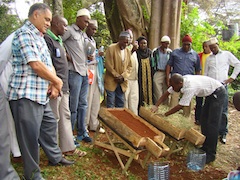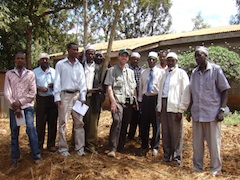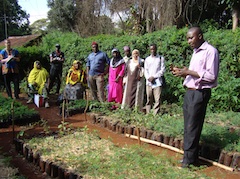| |
|
 |
Blog - New faith-based approach to farming for Muslim farmers in Kenya
February 3, 2014:
 |
 |
 |
Participants see how soil covered in mulch retains moisture much better than bare earth |
After learning about a Christian approach to agriculture, Farming God's Way, that is transforming the way Christian farmers care for their land while also increasing crop yields, ARC's Muslim partners asked if there could be an equivalent for the Islamic World. ARC's new Africa project officer Sam Adams, who is just back from Nairobi, writes about the first workshop in Kenya to test the new curriculum before its formal launch in March this year.
Having lived in Africa for most of my childhood, I was excited to spend a week in Nairobi in January. My visit also had an exciting and significant purpose - to introduce a brand new curriculum for Muslim farmers named Islamic Farming.
This faith-based approach to conservation agriculture has been developed by ARC and Global One 2015, following requests from ARC's Muslim faith partners, and will be formally launched in Kenya in March 2014. The three-day workshop in Nairobi was aimed at testing the new curriculum in the field and also training members of the Supreme Council of Kenya Muslims (SUPKEM) which plans to develop 10 Islamic Farming demonstration sites.
The inaugural training in Nairobi, attended by 30 rural farmers and led by Dr Husna Ahmad of Global One 2015 and Abdalla Mohamed Kamwana of SUPKEM, kicked off with an overview of some of Islam’s greatest agricultural achievements, looking at how historic Islamic communities pioneered new technologies. Muslim farmers can learn from their scriptures about Allah’s provision (“rizq”) and from the many stories of divine wisdom and blessing, such as the story of Yusuf and his careful management in a time of drought.
 |
 |
 |
Sam with some of the participants |
'Powerful spiritual knowledge'These theological foundations set the tone for the rest of the training. And they are what make Islamic Farming stand out as unique. A faith-based approach to agriculture gives farmers not just technical knowledge, but also the powerful spiritual knowledge of hope and trust in the divine.
As the training moved on to technical skills, the farmers were constantly encouraged to look to creation for inspiration. It is in creation that we can see a system that is beautiful, abundant, and sustainable. For example, we see a diversity of species, including both livestock and plants.
The farmers at the training were taught about intercropping, rotations and agroforestry. These methods give mutual benefits to the various crops as well as naturally breaking the pest cycle.
Likewise, creation is free from chemical fertiliser. Islamic Farming teaches farmers to enrich the soil naturally through applying manure and compost. Instead of ploughing, which does not occur in creation, farmers were taught how to dig individual planting holes. Mulch, the natural cover of debris on the forest floor, should be applied around crops. These methods avoid soil erosion and increase soil moisture and fertility.
 |
 |
 |
Raphael Magambo of A Rocha Kenya talks through some of the principles behind conservation agriculture |
'I am ready to go home and start this work!'A touching story we heard was from the oldest gentleman present. He told us that he had met ARC’s founder Prince Philip on a Royal visit to Kenya in 1952. After the training, the man added: “I am a farmer, but I’ve never thought of keeping animals, nor the value of organic manure. I’ve learnt so much…I can even get nutrients and fertiliser from trees.” Before the training had ended, one of the ladies present exclaimed: “I am ready to go home and start this work!”
The training was organised with the Supreme Council of Kenyan Muslims, Global One 2015 and A Rocha Kenya. It was felt to be a huge success by all parties and I relished the opportunity to be back on African soil.
Now the 30 participants have returned home and are putting the learning into practice. Their mandate is to share the curriculum with their neighbours and communities and spread the message of a faith-based approach to conservation agriculture.
Islamic Farming will be launched in March 2014 in Kenya before being introduced into other countries in sub-Saharan Africa. For more information, visit ARC's Africa project pages.
|
 |
 |
|
|
|
|
|
 |
Islamic Farming
At ARC’s Nairobi celebration in September 2012, Muslim participants listened to presentations on a Christian approach to agriculture. At the end they had a question: “What about Muslim farmers? Why isn’t there a faith-based approach to farming for our farmers?” Out of one billion people in sub-Saharan Africa, 234 million are Muslim, and many are small scale farmers.... So we helped them develop Islamic Farming. |
 |
Africa: Farming God's Way
"In 2012 he harvested 89 kilos of potatoes from his Farming God’s Way plot compared to 51 kilos of potatoes from the conventional plot. His bean harvest was even more impressive – three and a half times as much" An initiative among Christian communities in Africa makes God the Master Farmer, and improves yields in a natural way. |
 |
October 30, 2013:
East Africa's first national faith eco network launches in Uganda
The first environmental network of Uganda faith groups launches in Kampala today. The network will work on the environment and
promote sustainable agriculture. |
 |
 |
|
|

